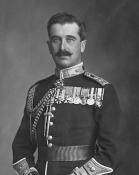
War Memorial
| Captain Thomas Henry Rivers BULKELEY CMG MVO | |
|
2nd Battaion Scots Guards Date of birth: 23rd July 1876 Date of death: 22nd October 1914 Killed in action aged 38 Commemorated on the Menin Gate Panel 11 |

|
| Thomas Henry Rivers Bulkeley was born at Oak Cottage, New Woodhouses, Whitchurch in Shropshire on the 23rd of July 1876 the son of Colonel Charles Rivers Bulkeley CB, Oxfordshire and Buckinghamshire Light Infantry, and Constance Clementine (nee Davenport) Bulkeley later of Clewer Lodge, Windsor in Berkshire. He was educated at Eton College where he was in Mr C.H. Allcock’s house from April 1890 to April 1895. On the 16th of December 1893 he was commissioned as a 2nd Lieutenant in the 4th Battalion Oxfordshire Light Infantry (Militia) and was promoted to Lieutenant on the 16th of January 1895. On the 9th of April 1898 he was appointed as Instructor of Musketry, a position he relinquished on the 28th of December that year. He was promoted to Captain on the 24th of May 1898 but this was cancelled at his own request on the 1st of July. On the 3rd of January 1899 he transferred to the Scots Guards as a 2nd Lieutenant and was promoted to Lieutenant on the 4th of April 1900. He served as Adjutant of his battalion from the 20th of July 1901 to the 20th of July 1904 and was promoted to Captain in July 1904. He was a freemason and was admitted as a member of the Studholme Lodge on the 27th of January 1899. He served in the South African War with the 1st Battalion Scots Guards, taking part in the advance on Kimberly, including the action at Belmont on the 23rd of November 1899, where he was severely wounded when hit by three bullets in the leg. Colonel Paget wrote saying that despite his wounds he refused to fall out and continued fighting until victory was complete. He was mentioned in General Methuen’s despatch of November the 23rd 1899:- “.... to draw attention to the valuable services rendered, and to the pluck displayed by Lieutenants Bulkeley and Alexander, both of whom insisted on going on after they were wounded”. He took part in operations in the Free State, and at Paardeberg; actions at Poplar Grove, Dreifontein, Vet River and Zand River; operations in the Transvaal including actions near Johannesburg, Pretoria, Diamond Hill and Belfast. For these services he was awarded the Queen’s Medal with six clasps and the King’s Medal with two clasps as well as being mentioned in despatches in September 1901 and July 1902. He served as Adjutant of his battalion from the 20th of July 1901 to the 20th of July 1904 and was promoted to Captain in July 1904. On the 13th of December 1904 he was seconded for service on the Staff and on the 18th of November 1905 he was appointed as Aide de Camp and Comptroller of the Household of Lord Curzon, Viceroy of India, serving from 1906-1907; he held the same post under Lord Minto. On the 28th of September 1907 he was appointed as Aide de Camp to Field Marshall His Royal Highness the Duke of Connaught and Strathern , Inspector General of the Forces and High Commissioner of the Mediterranean. On the 24th of April 1909 he was appointed to the Royal Victorian Order (Fourth Class) on the occasion of His Majesty’s visit to Malta. In October 1909 he was appointed as Equerry to the Duke, who had been appointed as Governor General and Commander in Chief in Canada, and was Comptroller of his Household in Canada, a position he held until the beginning of the Great War. On the 7th of January 1911 he was appointed as an Ordinary Member Third Class of the Companion of the Order of St Michael and St George and the Royal Victorian Order. He was married to Annie Evelyn (nee Pelly) on the 19th of April 1913 at the Guards Chapel. They had a son Robert Arthur Henry who was born on the 16th January 1914 and who also served as a Major in the Scots Guards during the Second World War. After the war the family were living at Hill Brook Place, Iver Heath in Buckinghamshire. He was a member of the Guard’s, Carlton, Junior Carlton and Shrewsbury County Clubs. On the outbreak of war he resigned his position and rejoined his old battalion on the 1st of September 1914, landing with them at Zeebrugge on the 7th of October 1914. On the 22nd of October 1914 the 2nd Battalion Scots Guards were at Ypres and had been heavily engaged there for a week. Captain Rivers-Bulkeley was in command of the Left Flank Company and his company, along with the rest of the battalion, had been marching for most of the night before reaching Veldhoek, just to the north of the Menin Road, at 5am. At 6am heavy German shelling began on the 21st and 22nd Brigades who were holding the line in Polygon Wood. At 8am the battalion was ordered to move a mile to the north to support 22nd Brigade. As they moved across the open fields they came under shelling, suffering seven casualties on route. They moved into positions in thick woods and waited there until 3pm. Then, two companies were ordered to move to the south to reinforce 20th Brigade at Kruiseeke who were being hard pressed by enemy attacks. Still in Polygon Wood, Thomas Rivers-Bulkeley led six men forward to make a reconnaissance and was killed by a shell. His body was recovered and buried but was lost in subsequent fighting. A brother officer wrote;- “The battalion has lost its very best officer- the best I ever served with. The Germans had got a brigade of maxims and some guns right up to our positions, where we were hanging on for dear life till reinforcements arrived, under a withering gun and maxim fire. Our line was broken and Tommy with his own company was sent in to fill the gap -I after him, supporting him with F Company. He never looked behind, with six men he went forward, followed by the company. He walked right on and was not more than 100 or 200 yards range. His advance was magnificent, it stopped a gap being forced in our line, regiments behind took heart and poured into the breach” He was a member of the Guards Club. His brother, Captain Charles Ivor Rivers Bulkeley Scots Guards, was killed in action on the 16th of May 1915. He is commemorated on the war memorial at Eton College and on the memorial at Ash in Shropshire. |
|
| Went on to Eton College |
Back